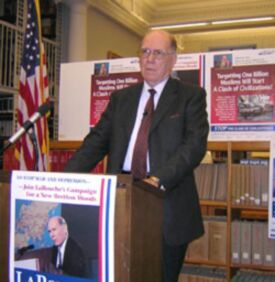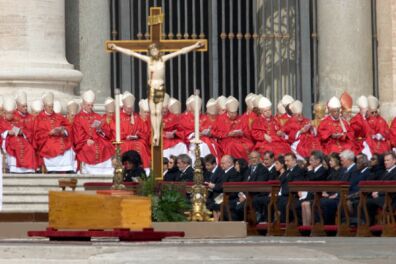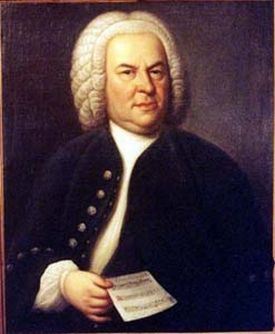Objectively Helpful
From The New CriterionThere is, alas, nothing very remarkable about the fact that Representative Cynthia McKinney (D.-Ga.) should have given public voice to her suspicions that the President of the United States (R.-Tex.) was complicit in the terrorist attacks on the World Trade Center and the Pentagon, that he knew about them in advance and did nothing to forestall them because his corporate friends stood to make a lot of money out of the war that he knew would follow. It was rather more remarkable that such paranoid lunacy was reported in the Washington Post. The pillars of the American journalistic establishment can usually be relied upon to treat such a faux pas by someone whom they regard as being, even ex officio, a “black leader” with the discretion of a good domestic servant. Most Americans still do not know, for example, that “Minister” Louis Farrakhan makes no secret of his plainly delusional belief that he has been “taken up” into a space-ship for posthumous conversations about the future of the world with the Hon. Elijah Muhammad — and then, as President Kennedy once said in another context, “safely returned to the earth.”
Most remarkable of all, however, is the fact there now appears to be so little disposition among our political and journalistic élites to regard such a charge, acknowledged by Rep. McKinney herself to be merely conjectural, as being in any way extraordinary. The Post reporter, Juliet Eilperin, dutifully sought a “reaction” from the administration and “Bush spokesman Scott McLellan” dutifully supplied one: “The American people know the facts,” he said, “and they dismiss such ludicrous, baseless views.” Then, referring to the fact that the Congresswoman had also complained in a radio interview that “an administration of questionable legitimacy has been given unprecedented power,” he added that “the fact that she questions the president’s legitimacy shows a partisan mind-set beyond all reason.” Actually, it’s not the questioning of his legitimacy that shows such a “mind-set” but the questioning of his honor. But isn’t there also something a bit “beyond all reason” about the President’s being asked for a reaction to such ravings in the first place? It is as if he were being asked for his reaction to Elvis sightings.
Not for the first time in these pages I have occasion to observe that it is only very recently that we have finally spent moral legacy coming down to us from the days when congressmen, and to some extent even the “gentlemen of the press,” (it is not coincidental that they were men) really were, or at least were expected to be, “honorable.” Even ten or a dozen years ago, I think, someone in a position of public trust who held the views of Rep. McKinney would have felt inhibited from expressing them publicly. There would have been some residual sense of shame at having nothing to “back up” such a charge, some respect for the office of the man against whom it would have been made and perhaps even some dim folk memory of a time when certain kinds of charges would have been met with a challenge to deadly combat. Of course, it is also possible that Ms. McKinney was not unaware that her sex protected her from being called to the field of honor by some champion of the President — he himself being barred by the rules of honor from challenging a subordinate.
At any rate, for the congresswoman as for so many other people these days, there were no inhibitions. Ms Eilperin, no doubt in search of “balance,” cited Rep. Jack Kingston (R-Ga.), said to be “a friend of McKinney’s,” as paying tribute to her on the grounds that she is “adept at seizing on ‘red-meat’ issues that resonate with her political base and have helped her fend off a series of GOP challengers.” In other words, the assumption on all sides is that politicians will say what “resonates with their base” quite irrespective of any question as to the truth or falsity of what they say. Her gallant Republican defender then goes on to say of Ms. McKinney that “She’s not as random as people think. . . People always want to hear a political conspiracy theory.” And so they do too. That is why, in place of honorable public servants, we now have the ethos of the supermarket tabloids, for whom one titillating story is as good as another, since their only purpose is to sell newspapers.
But what else should we expect when there is no price to be paid for any falsehood uttered in the public dialogue, unless in the course of uttering it you steal someone else’s words? All the recent fuss — and a certain amount of Schadenfreude — about “plagiarism” in the cases of Doris Kearns Godwin and Stephen Ambrose may be partly to reassure ourselves that we do have some standards of truth and falsehood that still mean something to us. The truth and genuineness of the process by which discourse may be supposed to emerge from thought is still important, the falsehood or fraud of same still a scandal. As to the truth or falsehood of discourse’s content, well, no one any longer feels competent to judge. Therefore, anyone can say anything.
In somewhat the same way, the “peace process” in the Middle East remains sacrosanct — an avowed commitment to it is, according to the President, all that stands between Yasser Arafat and the label “terrorist” — even as the outcome of this “process” has proven to be nothing but that other process which is known to the media as the “cycle of violence.” Such morally neutral terminology, such refusal to differentiate between good and bad violence, or between law-enforcement and criminality, is thought to be highly sophisticated and “nuanced” (a favorite word) by the intelligentsia of the media, who nod with approval when mad King Lear says, “See how yon justice rails upon yon simple thief. Hark in thine ear: change places, and handy-dandy, which is the justice, which is the thief?” Actually, it’s not all that hard to tell for anyone who is not beside his five wits (they forget that Lear goes on to propose shoeing a troop of horse with felt “and when I have stol’n upon these son-in-laws,/ Then kill, kill, kill, kill, kill, kill!”).
Yet the assumption of moral equivalence between the terrorist and those who seek to punish terrorism is all but universal in the media. Or, as Todd Purdum put it in the New York Times, “a general abhorrence for attacks on innocent civilians is tempered by ambivalence in many unsettled corners of the world about just what it means to be a terrorist, and fierce debates about whose political or ideological interests are being served, or justified, or gored.” Such “fierce debates” constitute a kind of cycle of violence of their own, and one in which the journalist is equally determined not to take sides. “If Israel sees its military campaign in the West Bank as a justifiable echo of Mr. Bush’s assault on Al Qaeda, Palestinians claim affinity with the American colonists’ revolt against an occupying power,” writes Mr. Purdum. And there it is: Yasser Arafat as George Washington. Remember when it was Ho Chi Minh? As in the case of Rep. McKinney, who is to decide who’s right?
Thus when the President adopts, even if only for diplomatic purposes, a similar point of view (only maybe without the comparison to his illustrious predecessor-George), journalists like Mr Purdum crow that “Mr. Bush was forced to acknowledge a more ambiguous reality.” As usual, nothing brings a warm glow of self-congratulation to the breast of the newspaper-man (or, indeed, -woman) than the belief in his superior intelligence as manifested in his understanding of this “ambiguous reality” and pointing to the shadings of “grey” that are (almost) invariably to be found between the “black” and the “white.” True, the blacks and whites of race and “racism” remain unperturbed by any putative grey in their makeup, but you would be hard put to it to find any other moral or political matter referred to the analytical skills of our nation’s journalists that does not come out of the process looking far more grey than black-and-white.
Such a posture of moral relativism is thought to be as necessary to journalistic “objectivity” as the refusal to judge the veracity or otherwise of Representative McKinney’s charge against the President, but why should the political culture feel constrained to adopt the same pose? Apart from avoiding criticism as a simpleton from the likes of Mr Purdum and our equally sophisticated European allies, what did the President expect to gain by refusing to call Arafat a terrorist and dispatching Colin Powell to shuttle between him and the Israeli authorities who stood, guns drawn, outside his headquarters in Ramallah? Can he really have hoped that Powell would come up with yet another form of words that could be presented to the public as more of the “peace process” — however much it served in practice as a cover for more terrorism? Or did he feel that the burdens of leadership include the burden of having to be seen to be doing something, even when there is nothing (diplomatically at any rate) to be done? Maybe just the thought of seeming a simpleton in the eyes of America’s and the world’s élite is enough.
I suppose it would have been more surprising if Bush had shown the tough-mindedness to stake out a position in opposition to the overwhelming consensus of the political and journalistic culture. That way lies, as Newt Gingrich found to his cost, “extremism.” It is true that it would not be easy, in the terms of the American frame of political reference, to fix the “extremist” label on the pro-Israeli (or even pro-Sharon) lobby, but even Israel’s most doughty journalistic champions too seldom attempted to argue with such bedrock assumptions of the élites as those which give rise to notions like “the cycle of violence.” The Establishment (as we used to say back in the 1960s) clears its throat by saying, like Zbigniew Brzezinski (writing in the New York Times) about “the current crisis,” that “one can argue forever as to whether Yasir Arafat or Ariel Sharon is more responsible for its eruption. What is clear is that the two cannot reach peace together and neither can impose his version of it on the other.”
This is nonsense. Argue if you like that Arafat was justified in producing the “eruption” of suicide bombing and Israeli retaliation, but you can’t pretend that there is any case to be made that he is not “responsible” for it — if only because he has not denounced it. Nor is the other side of the antithesis any less disingenuous. It is not the case that neither Arafat nor Sharon can impose his “version” of peace on the other. On the contrary, though Arafat cannot, Sharon clearly can, and — until recently at any rate — he has looked like doing precisely that. It is just a question of where he may be persuaded to stop, and therefore how much civil disruption he is prepared to tolerate once he does so.
My concern here, however, is not with the delusions under which our politicians and statesmen seem to labor but with the assumptions which make them inevitable. Most, like the quasi-therapeutic notion of the “cycle of violence” and its corollary, which is the presumptive moral equivalence of all combatants, have their origins in the vague leftism of the 1960s. Questions of right and justice, as much as those of honor, are routinely submitted to a form of Marxian analysis which can take account of no idea of truth or falsity, right or wrong, apart from power relationships. Who/whom? as Lenin said. With only a slight intellectual effort, you can still identify the Palestinians with the proletariat and the Israelis with the doomed bourgeoisie, as many academic Marxists do, but this is not necessary.
Prior to such particularization there is the general principle that questions of right or wrong are insoluble in themselves, like the question of the truth or falsity of Ms McKinney’s accusation against the President, which is lent color by the sort of extended (but patently absurd) Marxism which reflexively supposes that no system which benefits its leaders can be just. That Bush may plausibly be supposed to have friends who profit from manufacturing or selling war’s matériel is enough to damn him. All questions must thus be translated into “objective” considerations of who is doing what to whom. No wonder that the media prefer to look at things in this way! The voice of such objectivity, they would argue, is their voice.
It would be a bold man who would predict any future for a media not so enthralled to vulgar Marxism, but there are some straws in the wind suggesting that America’s élite culture may be discovering in itself a disposition to rethink at least the more disastrous of the many assumptions that have come down to us from the 1960s. One is Joshua Muravchik’s magisterial Heaven on Earth: The Rise and Fall of Socialism, reviewed in these pages last month by Roger Kimball. Another is Steven Hayward’s The Age of Reagan: The Fall of the Old Liberal Order, 1964-1980 (Forum/Prima, 812 pp., $35). Despite its misleading title (there is almost nothing in it about the old liberal order, though there is a great deal about the new one) which amounts to nothing less than a rewriting of the still-popular media history of the heroic 1960s. Among other things, Hayward shows how the habit of the irresponsible and intemperate political rhetoric of a Cynthia McKinney dates back to the liberal anti-Goldwater campaign of 1964.
But perhaps most remarkable has been the appearance on PBS in April of a series called “Commanding Heights: The Battle for the World Economy” by William Cran and Daniel Yergin, based on a book of the same title by Yergin and Joseph Stanislaw. With a thrilling sweep and authority, the three two-hour programs managed to put before the camera a significant percentage of all the people who have been most influential in effecting the world’s gradual shift from Marxist and quasi-Marxist or Keynsian economic ideas, and all that they implied in the way of political oppression, to liberal and free-market ones over the last quarter century. Beginning with the conversations between Keynes and Friedrich Von Hayek when both were fire-watchers at King’s College, Cambridge, during the way, and ending with the seemingly inexorable progress of liberal economic ideas during the 1990s, the series shows that it is possible to make television a kind of intermediary between the aridity of scholarship without knowledge of the world and the mere popularization that it is generally guilty of when it attempts to deal with serious subjects.
The ambitious producers have traveled all over the world to interview the politicians and real-world economists who actually attempted, some of them quite unsuccessfully, to put into place the reforms that have turned some of the most grim and poverty-stricken places on earth into places more like the first world than the third. It is among other things, a great detective story. For example, the key to much of the drama in the second episode, “The Agony of Reform” is the story of the British spy in the Kremlin, Oleg Gordievsky, who was smuggled out of the Soviet Union in the trunk of a car while a British woman agent distracted the KGB sniffer dogs at the Finnish border with potato chips.
Gordievsky brought with him the first hard information that the West had been concentrating on arms control questions so much that it had neglected the fact that the Soviet economy was a basket case on account of its ruinous expenditure on arms. Gordievsky said that it was as much as a third of GDP — at the height of the Cold War the U.S. never spent more than about five or six per cent of GDP — and proved later to be nearer a half. “They were deceiving the world.” On this knowledge was built the “arms race” of the 1980s that finally rendered the Soviet position untenable and brought about the end of the Cold War.
The series is not without its mistakes. “Lenin’s revolution,” the narrator solemnly tells us, “industrialized a backward country in a single generation.” This is a bit of leftover Leninist myth — the stuff is as hard to root out as crabgrass — and ignores the evidence that the Russian economy was growing much faster before the revolution than after it. Though inclined to give credit to President Reagan for his exhortation: “Mr Gorbachev, tear down this wall!” and for the strategy of bankrupting the Soviet economy by accelerating the arms race, it also pays its even-handed tribute to Gorbachev, citing the phone call from Poland after Solidarity won national elections. “What do we do now?” asked Polish party officials.
“Nothing. Accept the result of a free election,” said Gorbachev.
It was, we are told, “the phone call that ended the Cold War.”
Perhaps so, but you could just as well say that the Shah of Iran brought about the reign of the Ayatollahs by losing his nerve and not ordering his troops to fire on the demonstrators who were calling for Khomeini to lead them. Every Soviet leader gave a public demonstration of the fact that the only alternative to liberalization was brutal force. Gorbachev simply did so in a negative way. Like most of us, he deserves credit for not killing people. Or not as many as he otherwise would have killed.
Most seriously, the third episode, “The New Rules of the Game” is far too indulgent to the “anti-globalization” protestors of Seattle, Quebec City and so forth, who are not identified (as they should be) as the rag-tag remnant of the Luddite hippie-left of the 1960s.
But much can be forgiven for the sake of the appearance on such an organ of the Establishment as PBS of an acknowledgment that, as Ricardo Lagos, the post-Pinochet president of Chile puts it, people have finally learned to agree that what mattered “was not right or left but a sound economy. But it took a long time to learn it.” Or as Yergin says, “The world” — by which of course he means the intellectual world — “had changed its mind.” And if one sort of Marxian thinking passed away (except, of course, for its continuing place of privilege on the university campuses of the world’s capitalist superpower), maybe the kind that is more common in the media, the kind that refuses to take sides between true and false or right and wrong but only notes which is more powerful, will also some day — far in the future no doubt — begin to disappear.
[Top][Back]
Discover more from James Bowman
Subscribe to get the latest posts to your email.






